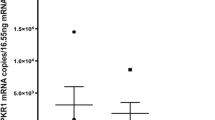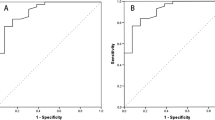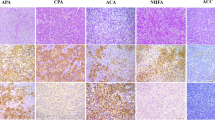Abstract
Purpose
In this study, we aimed to investigate the endocan expression in tissue samples of patients diagnosed with Cushing’s syndrome (CS) due to Cortisol-Producing-Adenoma (CPA) and compare it with normal adrenal cortex tissue, and also to evaluate the correlations of endocan expression with clinical and histopathological features.
Methods
11 patients who were operated for CS due to CPA between 2009–2021 and 14 control subjects with normal adrenal cortex were included in the study. Demographic, laboratory and clinicopathological data of the patients were recorded. Sections of 4–5 µm thickness were taken from paraffin blocks of patients diagnosed with CS due to CPA and control subjects with normal adrenal cortex tissue. The sections were then stained in a closed system automatic immunohistochemical staining device to perform immunohistochemical analysis. The endocan positive grade were determined based on the proportion of stained cells on a scale of negative to strong.
Results
The number of subjects with positive endocan expression and the mean endocan expression level in the CS group were significantly higher than the control group (p = 0.005, p < 0.001, respectively). No correlation was found between endocan expression and clinical and histopathological features.
Conclusion
According to the results of our study, endocan overexpression in CPA tissues may be related to the hormonal functionality of CPA.

Similar content being viewed by others
References
J. Lindholm, S. Juul, J. O. Jørgenson et al. Incidence and late prognosis of Cushing’s syndrome: a population-based study. J. Clin. Endocrinol. Metab. 86, 117–123 (2001)
J. Etxabe, J. A. Vazquez, Morbidity and mortality in Cushing’s disease: an epidemiological approach. Clin. Endocrinol. 40, 479–484 (1994)
G. L. Semenza, HIF-1 and human disease: one highly involved factor. Genes Dev. 14, 1983–1991 (2000)
A. A. Ucuzian, A. A. Gassman, A. T. East, H. P. Greisler, Molecular mediators of angiogenesis. J. Burn Care Res. 31, 158–175 (2010)
X. Huang, C. Chen, X. Wang et al. Prognostic value of endocan expression in cancers: evidence from meta-analysis. Onco. Targets Ther. 9, 6297–6304 (2016)
S. S. Pereira, M. M. Costa, S. G. Guerreiro, M. P. Monteiro, D. Pignatelli, Angiogenesis and lymphangiogenesis in the adrenocortical tumors. Pathol. Oncol. Res. 24, 689–693 (2018)
Y. Miao, M. Zong, T. Jiang, X. Yuan, S. Guan, Y. Wang, D. Zhou, A comparative analysis of ESM-1 and vascular endothelial cell marker (CD34/CD105) expression on pituitary adenoma invasion. Pituitary 19, 194–201 (2016)
H. Sasano, Y. Ohashi, T. Suzuki, H. Nagura, Vascularity in human adrenal cortex. Mod. Pathol. 11, 329–333 (1998)
B. D. Grigoriu, F. Depontieu, A. Scherpereel, D. Gourcerol, P. Devos, T. Ouatas, J.J. Lafitte, M. C. Copin, A. B. Tonnel, P. Lassalle, Endocan expression and relationship with survival in human non-small cell lung cancer. Clin. Cancer Res. 12, 4575–4582 (2006)
X. Leroy, S. Aubert, L. Zini, H. Franquet, G. Kervoaze, A. Villers, M. Delehedde, M. C. Copin, P. Lassalle, Vascular endocan (ESM-1) is markedly overexpressed in clear cell renal cell carcinoma. Histopathology 56, 180–187 (2010)
F. Matano, D. Yoshida, Y. Ishii, S. Tahara, A. Teramoto, A. Morita, Endocan, a new invasion and angiogenesis marker of pituitary adenomas. J. Neurooncol. 117, 485–491 (2014)
Y. G. Huang, Y. Wang, R. J. Zhu, K. Tang, X. B. Tang, X. M. Su, EMS1/DLL4-notch signaling axis augments cell cycle-mediated tumorigenesis and progress in human adrenocortical carcinoma. Front. Oncol. 11, 771579 (2021)
Author information
Authors and Affiliations
Contributions
All authors contributed to the study conception and design. Material preparation, data collection and analysis were performed by M.C., M.K., M.K., and H.H.E. The first draft of the manuscript was written by M.K., F.K., and all authors commented on previous versions of the manuscript. All authors read and approved the final manuscript.
Corresponding author
Ethics declarations
Conflict of interest
The authors declare no competing interests.
Ethics approval
This study was performed in line with the principles of the Declaration of Helsinki. Approval was granted by the Ethics Committee of University Necmettin Erbakan (22.05.2020/No: 2020/2504).
Additional information
Publisher’s note Springer Nature remains neutral with regard to jurisdictional claims in published maps and institutional affiliations.
Rights and permissions
Springer Nature or its licensor (e.g. a society or other partner) holds exclusive rights to this article under a publishing agreement with the author(s) or other rightsholder(s); author self-archiving of the accepted manuscript version of this article is solely governed by the terms of such publishing agreement and applicable law.
About this article
Cite this article
Can, M., Kocabaş, M., Karaköse, M. et al. Expression of the angiogenesis markers endocan in Cushing’s syndrome due to cortisol producing adenoma. Endocrine 79, 554–558 (2023). https://doi.org/10.1007/s12020-022-03250-1
Received:
Accepted:
Published:
Issue Date:
DOI: https://doi.org/10.1007/s12020-022-03250-1




